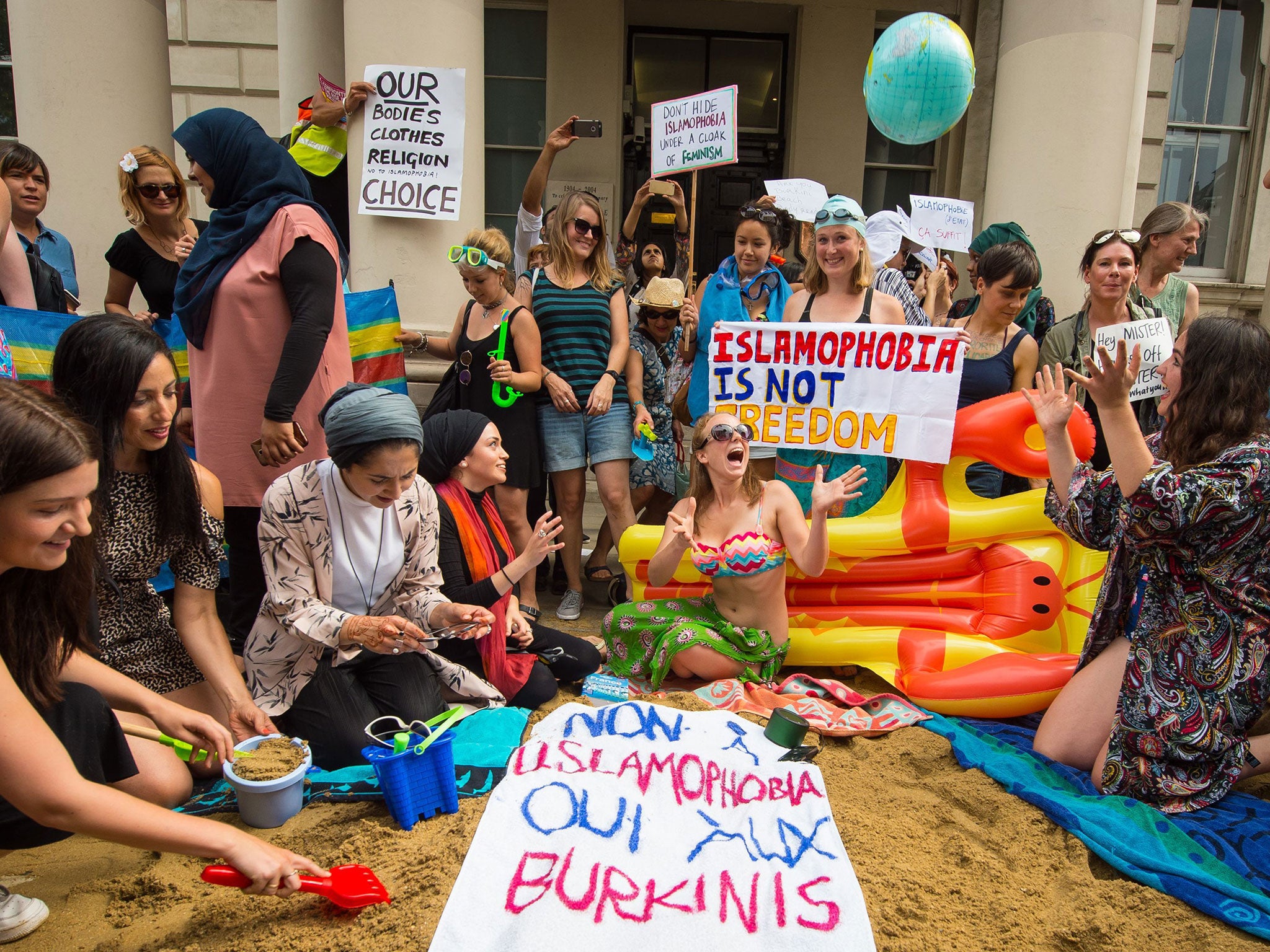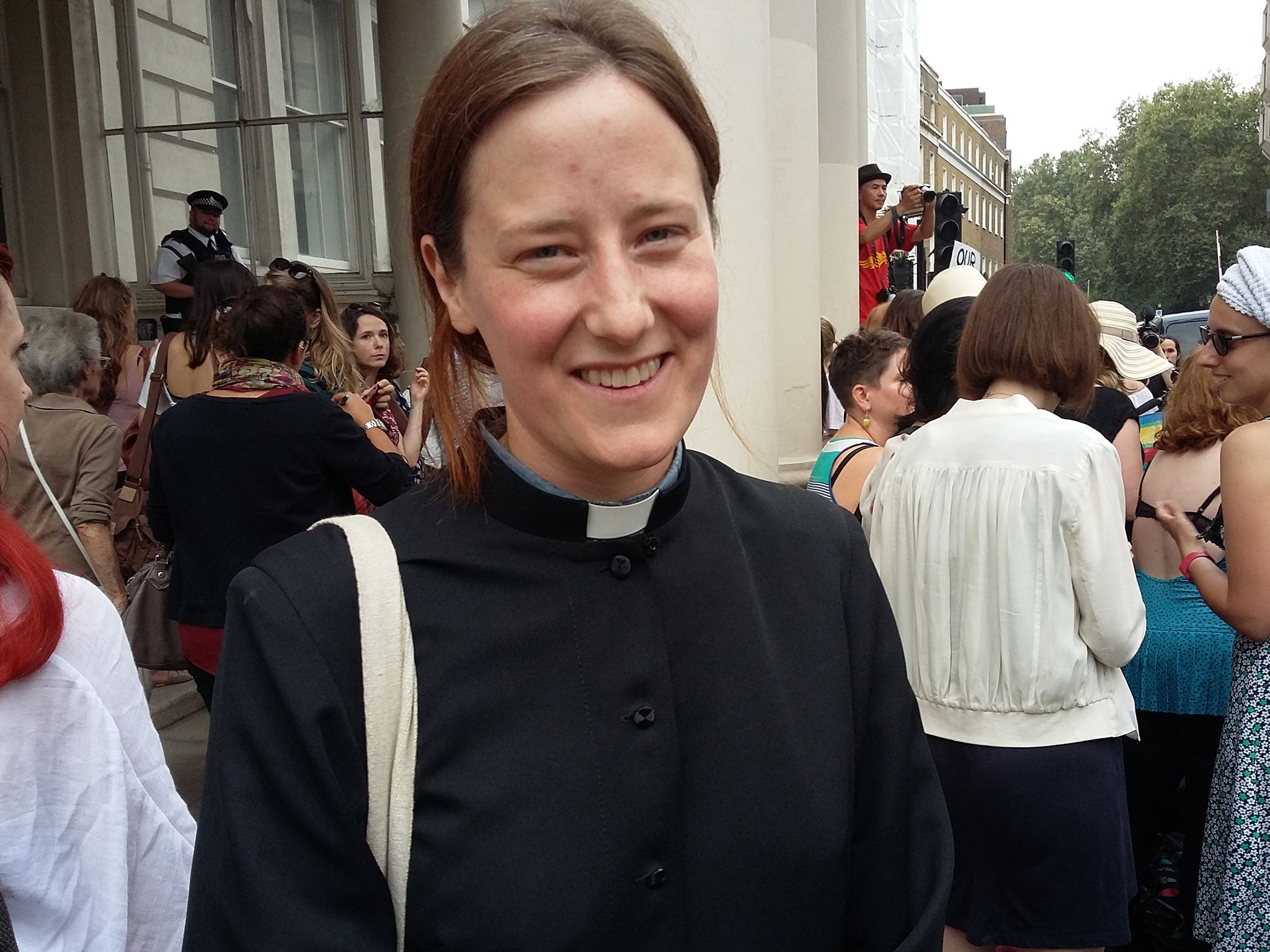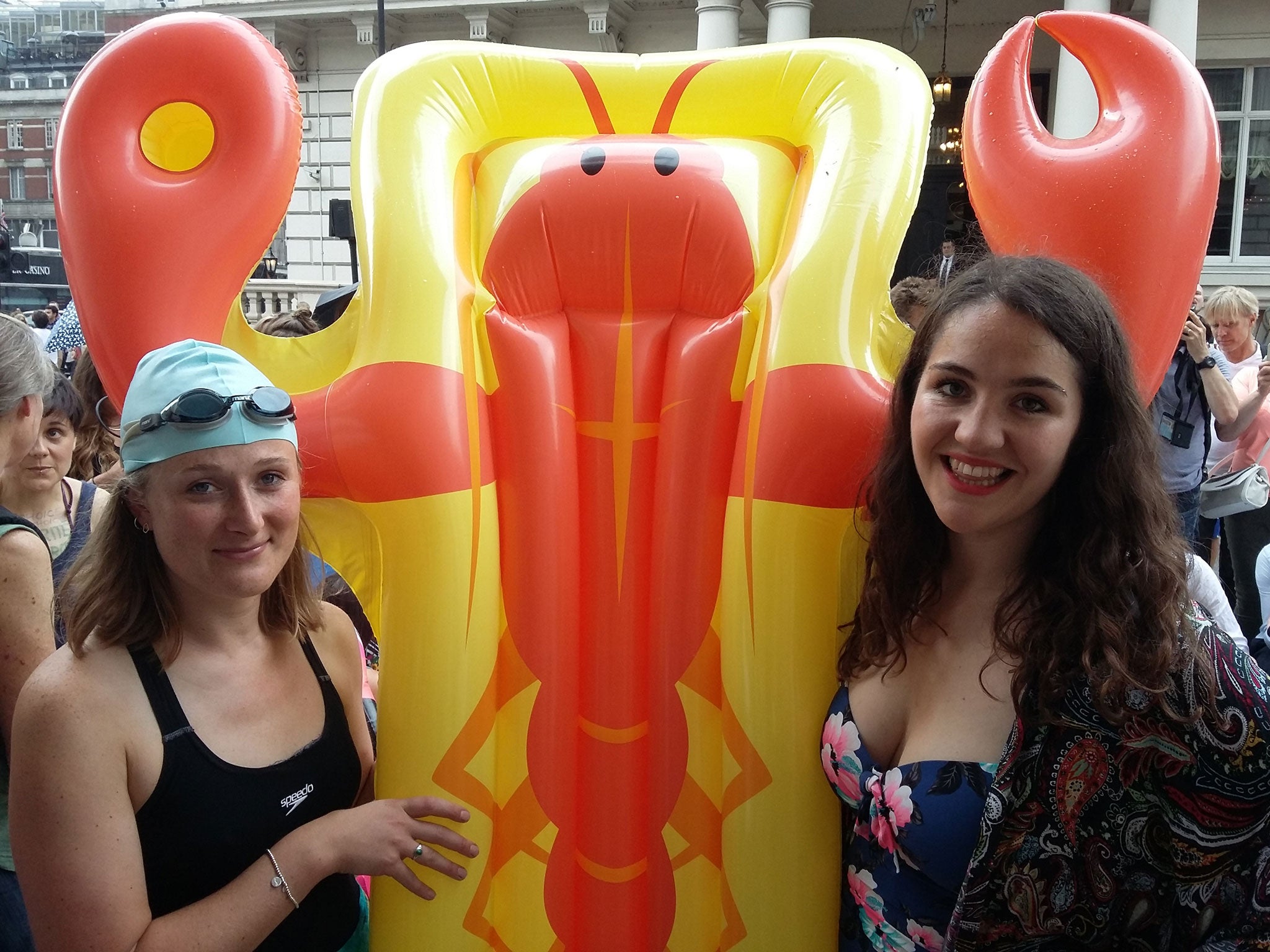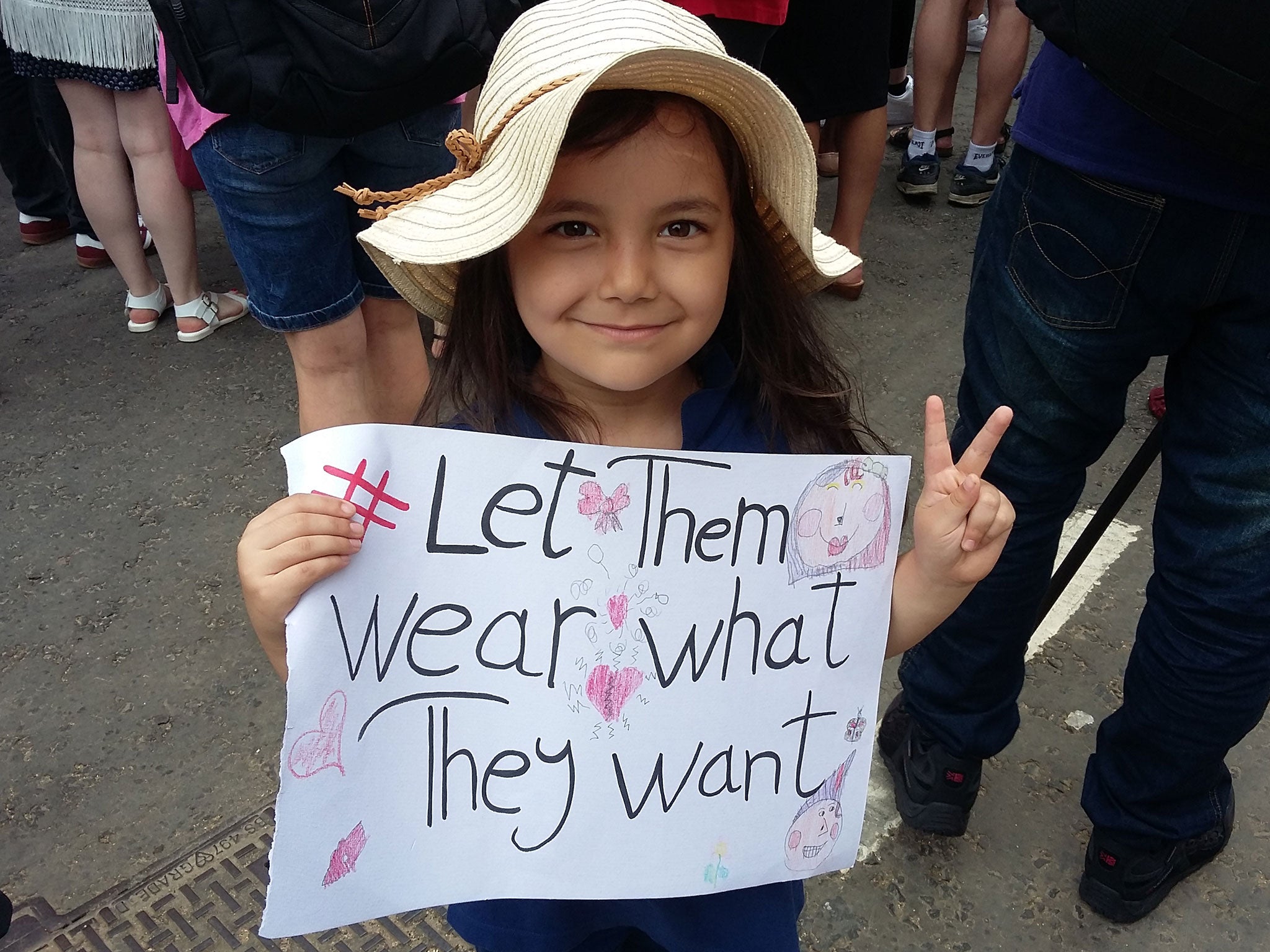Burkini ban: Women hold beach party outside London's French Embassy in protest against ‘ludicrous’ laws
‘The war on terror does not begin inside a woman’s wardrobe,’ one protester said
Your support helps us to tell the story
From reproductive rights to climate change to Big Tech, The Independent is on the ground when the story is developing. Whether it's investigating the financials of Elon Musk's pro-Trump PAC or producing our latest documentary, 'The A Word', which shines a light on the American women fighting for reproductive rights, we know how important it is to parse out the facts from the messaging.
At such a critical moment in US history, we need reporters on the ground. Your donation allows us to keep sending journalists to speak to both sides of the story.
The Independent is trusted by Americans across the entire political spectrum. And unlike many other quality news outlets, we choose not to lock Americans out of our reporting and analysis with paywalls. We believe quality journalism should be available to everyone, paid for by those who can afford it.
Your support makes all the difference.Women dumped tonnes of sand outside the French Embassy in London on Thursday for an impromptu beach party to protest the country’s “burkini bans”.
Demonstrators armed with lilos, inflatable flamingos and beach balls made sandcastles and chanted in opposition to “ludicrous” laws seeing Muslim women arrested and fined for covering up at Riviera resorts.
Esmat Jeraj, 27, organised the protest with friends after being shocked, as many were around the world, by images of a woman being ordered to remove her top by police officers in Nice.

“Just seeing what happened to that woman in Nice made me incredibly frustrated and upset and I thought ‘something needs to be done’,” she told The Independent. “I can’t even imagine how traumatising and humiliating that must have been.”
Ms Jeraj, who wears a headscarf, said she wanted the London demonstration to show solidarity with “anyone forced to wear anything, anywhere by anyone”.
Different reasons have been given for the bans in more than a dozen French communes and cities but several officials have made a link to a recent wave of Isis-inspired terror attacks.
“It’s absurd,” Ms Jeraj said. “The war on terror does not begin inside a woman’s wardrobe.
“By wearing a burkini, women are empowering themselves to go out and sit on the beach, and enjoy the sunshine and the French seaside with their loved ones and their families.
“By banning that what you are actually doing is pushing them to no longer be part of that society, and marginalising them further.
“That’s incredibly worrying when you look at Islamophobia and the way Muslims are being treated in France.”
Her fellow organiser, India Thorogood, was equally dismissive of claims that France is fighting female oppression with the burkini bans and its law forbidding full-face veils.
“It’s like they are trying to say that some men somewhere are sometimes telling women what to wear – but in response the French state are telling women what to wear,” she said. “Two wrongs don’t make a right.”
Their fellow protesters waved signs reading “Down With Islamophobia Under a Cloak of Feminism” and “Hey Mister, Hands off my Sister” and played with beach balls as bemused tourists took photos and armed police guarding the embassy steps kept a watchful eye.
Jenny Dawkins, a curate from All Saints Church in Peckham, joined the demonstration wearing a floor-length black cassock.
“I wear this because I want to and because of my religious conscience,” she told The Independent while blowing up a beach ball.

“I’m horrified that some women are being forbidden from wearing what their conscience dictates.”
Ms Dawkins doubted whether she would be fined for wearing her outfit on France’s beaches, despite the “vaguely worded” laws failing to specify what clothing is forbidden.
Some of her fellow protesters at the “Wear What You Want Beach Party” donned bikinis and swimsuits, while one woman was wearing a burkini.
Aina Khan said she bought one of the swimsuits, which cover the body and hair, for herself last year.
“When I walk onto a beach or in a public swimming pool, I don’t think: ‘Oh I’m oppressed, some man told me to wear this,’” she said.
“I chose to buy it because it’s my own religious convictions – no one has dictated that to me.”
Hitting out at “covert racism”, she accused France of betraying its professed values of liberté, égalité and fraternité at the expense of laïcité – constitutional secularism.
Friends Rebecca and Hannah, carrying a lobster-shaped lilo, said they were also concerned about the growing number of incidents showing xenophobia and racism in the UK.

“France is a neighbouring country and it’s not that different from what is happening here,” Rebecca said. “I worry about what kind of society we’re heading towards.”
While Islamophobia was a hot topic at the demonstration, many supporters saw the bans equally as a symptom of sexism, saying women’s bodies were once again being used as a “battleground for bigots”.
Somayia Khan brought six-year-old daughter to the event with hand-drawn sign reading “Let Them Wear What They Want”.
She said: “I didn’t tell her it was a Muslim thing, I told her that every woman has the right to wear what she wants, wherever she wants, whenever she wants.”
But not everyone at the protest agreed. A French woman shouted over demonstrators to announce her support for the burkini ban, telling the crowd how her mother had worn a veil in her home country of Algeria but never in France.
“France is a secular country and you must respect their laws,” she said. “The state has to protect the secular constitution.”

According to a survey by Ifpop, 64 per cent of French people are in favour of the burkini bans, while 30 per cent described themselves as “indifferent” and only 6 per cent of respondents were opposed.
French politicians remain divided. Manuel Valls, the Prime Minister, said the garments represented the “enslavement of women” and were not compatible with French values but the Mayor of Paris Anne Hidalgo condemned “hysteria” on the issue and called for more social cohesion.
Her London counterpart, Sadiq Khan, joined the criticism during his first official visit to Paris, saying: "I don’t think anyone should tell women what they can and can’t wear. Full stop."
The deputy mayor of Nice stoked further controversy on Thursday, claiming the sight of Muslim women fully covered on beaches made people feel "unsafe".
“If you are in the swimming pool or you are on the beach, with the situation as it is with the terrorist attacks, with the war in the Middle East... people don’t support it anymore,” Rudy Salles said.
The country’s highest administrative court, the State Council, has started examining the legality of the prohibition in the commune of Villeneuve-Loubet.
Its ruling is expected within days and will set a legal precedent for the rest of France.

Join our commenting forum
Join thought-provoking conversations, follow other Independent readers and see their replies
Comments